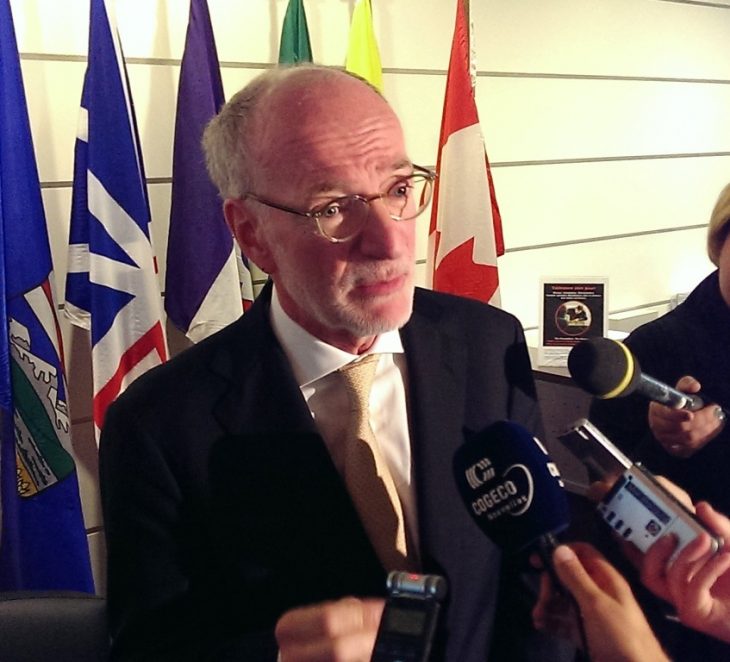
GATINEAU – Of all the interveners appearing so far at the CRTC’s TV Policy Review, the CBC’s might be the most contentious – and its executives endured a good grilling by the commissioners Friday morning on the fifth day of the Commission’s TV Policy Review.
The Crown Corp, which has had a rough past 24 months as most know, has come to the CRTC asking for a number of new things, but three aspects are drawing the most attention. It wants: to be able to shut off its transmitters and charge subscription TV providers a wholesale fee; for the Commission to create a new Local News Fund built from 1% of every Canadian’s TV bill; and any over-the-top video provider, foreign or domestic, earning more than $25 million annually to be forced to pay into the Canadian Media Fund.
(Although, given what the federal government had to say about applying new restrictions on OTT, that last bit, it would seem is moot, for now.)
“The system will no longer sustain the creation and distribution of compelling Canadian content in formats and on platforms that Canadians want,” CBC CEO Hubert Lacroix told commissioners in his opening statement. We think that conventional broadcasters should be paid by BDUs for the programming that BDUs take from them – just as specialty and pay services do. This change would restore balance to the business model of conventional broadcasters.”
Lacroix also said the Commission has the power to let the conventional broadcasters shut down their over-the-air transmitters (which CBC execs said was an outdated, inefficient distribution technology), and allow them to retain their must-carry privileges while also negotiating a fee for their carriage on BDUs. “The current environment creates challenges in meeting our mandate because these objectives can’t be met if, every year, because of a broken business model, we are forced to do less, if we are forced to reduce our contribution to the broadcasting system. Fixing the business model of conventional television will enable us to sustain our contribution to the system into the future,” he explained.
As for local news on those conventional stations, every broadcaster is claiming local news does not pay for itself and for local stations to live on, the business models must change. While Bell and CBC seem to be on the same page about calling for a wholesale fee for their local channels, CBC has also called for a new Local News Fund to be paid to all broadcasters doing local news, which, according to its written submission, would be equal to 1% of BDU gross revenues from broadcasting services.
It essentially sounds the same as the recently retired Local Programming Improvement Fund but as envisioned by the CBC, its proposal would bring in close to $120 million just from Rogers Cable, Videotron, Shaw Cable/Shaw Direct and Bell TV/Satellite, according to the 2013 aggregate financial data filed with the CRTC.
When it came to the wholesale rate though, CBC executives wouldn’t budge when asked what rate they were looking for. The said they hadn’t put any number on it yet, even internally.
Vice-chair Tom Pentefountas, didn’t seem to buy that, however. “Can I give you some simple math, Mr. (Steven) Guiton?” he asked the CBC’s CTO and regulatory chief.
“At a dollar a sub (per month) wholesale, which will be two dollars a sub retail… your 27 conventionals for CBC, 92 conventionals for the privates, you're at 119. Make it a round figure, 120 conventional TV stations. At 12 million subs, roughly, maybe it's 11 and a half… you're over $2 billion retail out of Canadians' pockets. That would be for CBC alone, $650 million. $325 million would go into the coffers of the CBC and $325 into the BDUs, if we follow the 9(1)(h) model as established if you're going to be doubling the retail as opposed to wholesale,” said Pentefountas.
“And I don't think that a buck a sub would be an unreasonable rate from your point of view, given the quality services that CBC/Radio Canada provide.”
He wasn’t the only commissioner worried about what the consumer can afford.
Chairman Jean-Pierre Blais (who earlier in CBC’s appearance mused whether or not CBC’s primary challenges stem mostly from a lack of support from “it’s main shareholder” i.e., the federal government) stepped in to say affordability is also a tenet of the Broadcasting Act and asked the CBC to provide in its final written comments what this new funding model for conventional broadcasters would look like, with a “low, medium, and high potential outcome” of such negotiations with BDUs, and “calculate how much money potentially could go to private conventionals that move to the system and what share of that would go to CBC? Set out all your hypotheses.”
For what it’s worth, 2013 CRTC filings show the pubcaster’s CBC News Network earned over $68 million from cable, satellite and telco TV subscriptions that year, for an average of about 52-cents per sub per month.
CEO Lacroix, despite reporters’ pressing after the CBC’s appearance, would not touch any figure at all, and to be fair, neither did Bell in its local specialty proposal to the Commission. He insisted the business model needs fixing first, then he’d worry about the negotiated dollar figure.
“You can throw whatever numbers you want. The situation is this will be something to be negotiated as you negotiate a fee for all the specialty channels whether it’s a TSN or Sportsnet or another specialty channel. This is an arm’s length negotiation and at the end of the day there is a price that is paid.” Lacroix said.
“The situation is very simple. Right now you have BDUs taking our signal, our content, and not paying us for it and this has been the same argument and the same position that all the conventional broadcasters have been taking over the past years.”
Photo by Greg O'Brien


